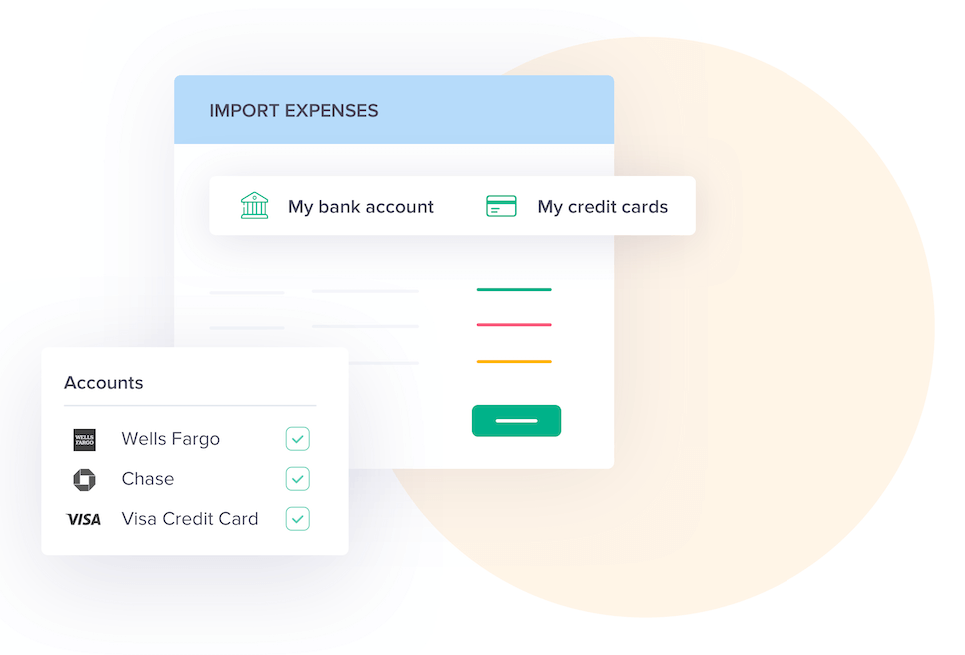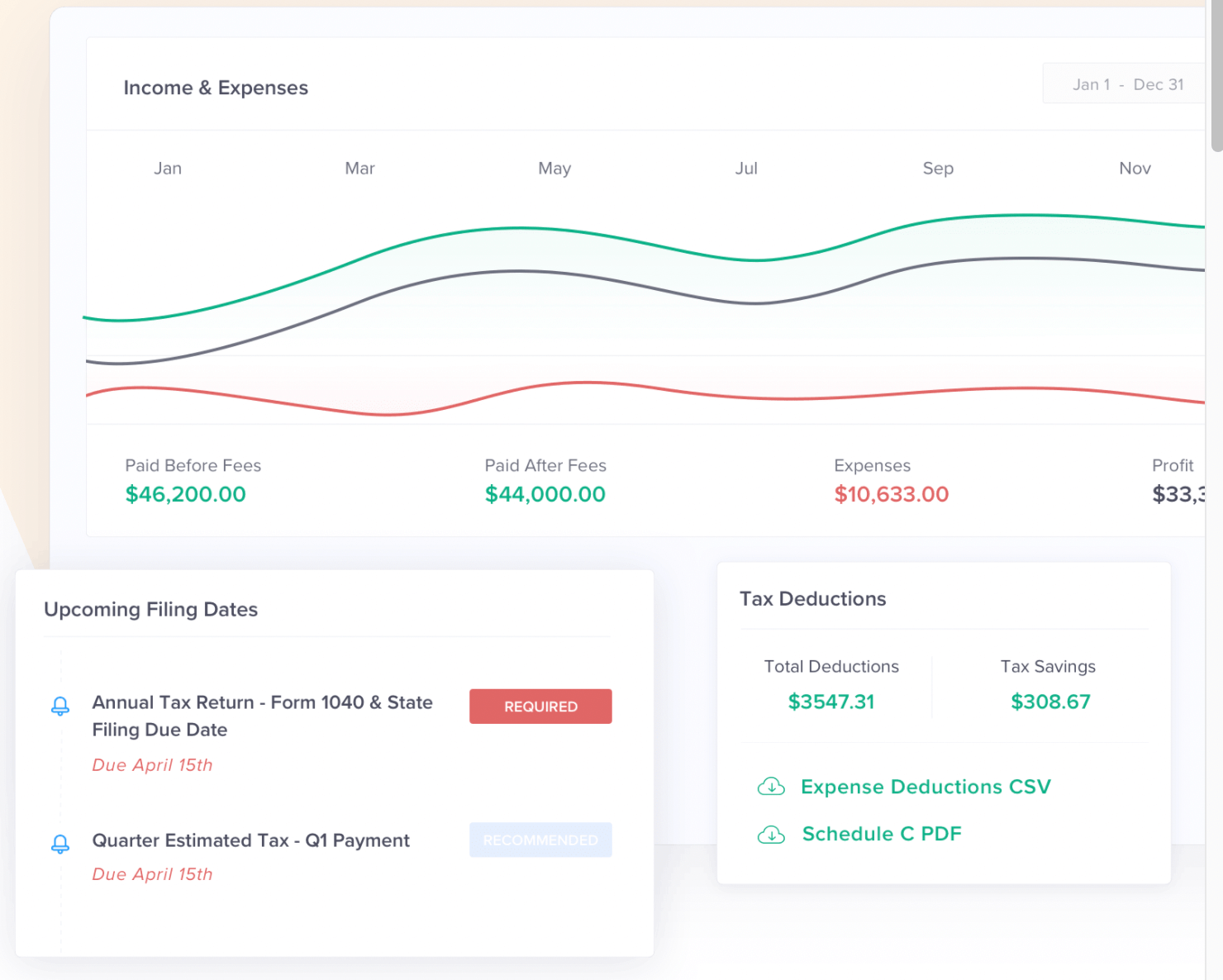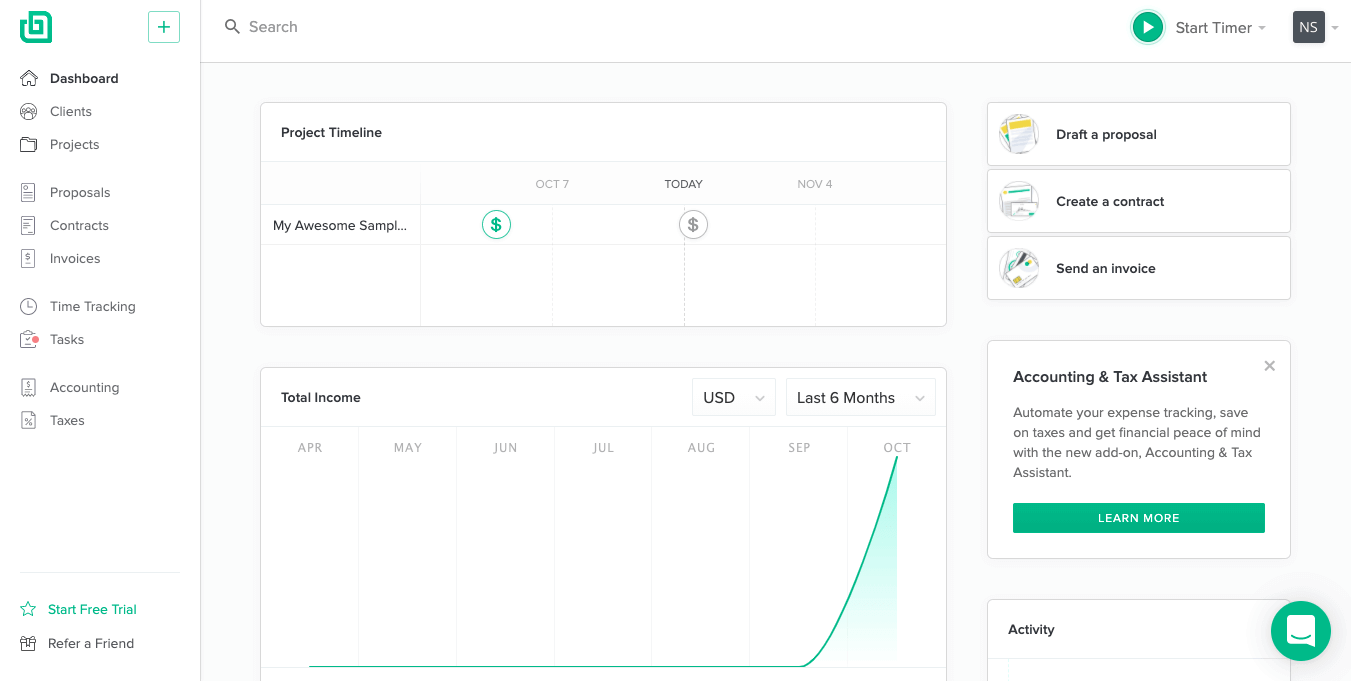Tax season is hardly ever exciting, but for self-employed workers, it can seem particularly overwhelming. Large businesses can afford to hire accountants to get their paperwork in order. In contrast, as an independent contractor, you’re responsible for tracking your spending, storing your receipts, and tax filing. Manually tracking your expenses with a template can easily become cumbersome.
Worse yet, you can lose saving opportunities. When you track your expenses manually, you can fail to find some potential tax deductions. And in effect, you may lose money that would have been best spent growing your business. That's where a tax deduction tracker comes into play.
In this guide, we’ll look at Bonsai Tax-- the best tax deduction tracker -- and how it can help solve your biggest tax headaches.
Note: Freelancers who use our tax software saves on average of $5,600 on their tax bill. Our app can help you maximize your write-offs and save you a load of money during tax time. Claim your 14 day free trial here.
Who Needs a Tax Deduction Tracker?
When trying to make the most use of tax write-offs, you’ll often find yourself wearing many hats. You’ll need to keep records of all your expenses -- both personal and business-related. You can do so by keeping a self-employment ledger, or if accounting isn’t your forte, you can store all your receipts in an envelope.
You’ll also act as your own accountant. This means you’ll have to sift through lots of credit card charges and receipts to find purchases that were legitimate business expenses and look for any possible tax deductions.
The problem with this approach is twofold. First, as your purchases rack up, you’ll often lose track of where your money is going. Second, you risk losing lots of billable hours -- and opportunities to win more business -- every tax season.
If this situation sounds too familiar to you, then it’s time to shift to a 1099 tax write-off tracker. Read on to find out some of the perks you’ll enjoy by using Bonsai for all your tax needs.

Why Track Tax Deductions Using Bonsai?
If you’re like most self-employed workers, then taxes probably inspire a special blend of boredom and doom for you. But it doesn’t always have to be this way; Bonsai Tax is the best tax software to make payments to Uncle Sam more bearable.
Bonsai Tax is an easy-to-use platform that helps self-employed workers, freelancers, and independent contractors like you remain organized and tax compliant.
The platform is designed to automatically identify deductible expenses, allowing you to maximize self-employment tax savings. It imports all of your expenses from the connected credit cards and bank accounts. Then, it scans your transactions to get any potential write-offs.
The software also categorizes your expenses according to their deductible potential so that you can get a better understanding of your spending. To top it off, it helps fill out a large part of your tax returns, while sorting your qualifying expenses into visual graphs for deducting.
On your end, you’ll only need to scan your receipts after every purchase, so you won’t have to go through the hassle of storing age-old paper receipts. Some of the best apps for tracking receipts for taxes, like Bonsai, can help you clear your clutter of receipts.
But automation is just one way of tracking your write-offs. Bonsai Tax also offers a free 1099 excel template that you can customize to fit your business needs. And you don’t need to know all the nuances of accounting to fill out the spreadsheet; it comes with comprehensive instructions that can help you categorize each expense properly.
Granted, the template doesn’t come with all the bells and whistles that the expense tracker offers, but it’s perfect if you’re running a small business with a tight budget.
Keep in mind that as your business grows, then you’ll be better off paying a small fee to access the more comprehensive premium solution. It will help free up time so that you can focus on winning more clients -- not to mention the peace of mind it will offer you.
Note: Seriously, save yourself a lot of headaches and avoid paying taxes (legally, of course) with Bonsai Tax. Our app will scan your bank/credit card statements to discover potential tax write-offs. Users on average save a whooping $5,600 from their tax bill with our software. Try a 7-day free trial today.

Other Benefits of Bonsai Tax
Bonsai Tax has a simple appeal: it offers more bang for your buck than most tax software. Not only does it make claiming tax write-offs more straightforward, but the freelancer app also provides other features that make your solopreneur life much easier. Some of these features include:
- It supports over 180 currencies, offering real-time foreign exchange rates for your purchases
- After analyzing your spending, it provides estimates for each quarter, detailing how much you’ll owe the IRS for the year
- Automatic small business expense tracking
- It provides an expense report which you can use to ensure your budget remains intact
- It allows you to customize your invoices and projects and include some of the expenses you incur
- It’s easy to access on either your PC or smartphone, provided you have an internet connection. You don’t need to download a mobile app or software, unlike with other tax deduction apps
Test drive the software today and uncover how much money you'll save on your taxes.
What Are Some of the Expenses You Can Deduct With Bonsai Tax?
When you’re self-employed, there’s a wide range of business expenses you can deduct and tax hacks you can take advantage of. Some of which may go under your radar when you’re calculating your deductions manually. The tricky part is distinguishing personal expenses from business-related spending. But Bonsai Tax can do most of the hard work for you.
Some business costs you can write off include:
.jpeg)
Business Meals
Updated laws now allow you to deduct 100% of your meals, provided the meal was only for business purposes. If you decide to conduct business either by visiting a restaurant or ordering food, then you can claim the business meal deduction. Bonsai Tax can help you track all your business meals to ensure you receive your 100% deduction.
Home Office Expenses
The home office deduction only applies if you conduct business from your home. It’s common with freelance writers, photographers, and developers, who often dedicate some space in their homes to focus on work. Some of the home office expenses you can deduct include repairs, home insurance, renters insurance, and rent. Alternatively, you can use the simplified method to claim a home office deduction.

Business Travel
If you’re traveling to attend client meetings or deliver products, then you can write off travel expenses. Note that your travel needs to be business-related, and you must have been away for at least one business day.
Bonsai, one of the best travel expense trackers, can help you expense 100% of your spending for flights, car rentals, and hotels -- and 50% of your meal costs when traveling.
Internet and Phone Charges
Chances are high that the internet plays a big part in your day-to-day business. The IRS allows you to deduct your entire phone and internet bill on your income tax return.
And if you don’t own a dedicated line for your business, then you won’t claim the entire cell phone tax deduction; you’ll only claim the percentage you use for your business.
Continuing Education Expenses
Sometimes you may need to take some extra courses to grow your business. The IRS allows you to claim education deductions for such an expense. These can include everything from tuition fees, book costs, to commuting expenses. The deduction only applies when your education helps you improve your present business.
If you want to know more about the write-offs available to you, then you can check out this comprehensive list of the best 1099 deductions for independent contractors.

Final Thoughts
Tracking and calculating your deductions doesn’t have to be a hassle anymore. You can let Bonsai solve your biggest tax headaches by signing up today.






